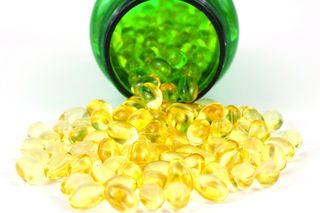Can Too Much Vitamin D Be Toxic?

As more Americans take vitamin D supplements, there has been concern that more people could experience toxic effects from very high vitamin D levels. But a new study shows that people rarely experience harmful side effects when taking large amounts of vitamin D.
Researchers analyzed information from more than 20,000 vitamin D blood tests performed on people living in Rochester, Minnesota, and the surrounding area over a 10-year period. They looked to see how many people had "high" vitamin D levels, defined as levels over 50 nanograms per milliliter. (Normal vitamin D levels are between 20 and 50 ng/mL.)
About 8 percent of the people had vitamin D levels over 50 ng/mL, but 0.6 percent had even higher levels, over 80 ng/mL, and 0.2 percent had levels over 100 ng/mL.
The researchers also found that the proportion of people with high vitamin D levels increased considerably during the study period — from 9 per 100,000 people in 2002 to 233 per 100,000 people in 2011. This spike is likely due to an increase in people taking vitamin D supplements, either because a doctor prescribed them or because they decided on their own to take them, the researchers said.
Despite this increase, the people in the study rarely experienced hypercalcemia, or high blood calcium levels that can occur as a result of high vitamin D levels. The condition can cause weakness, vomiting and kidney problems, and is the main side effect of high vitamin D levels.
In fact, there was no link between people's vitamin D levels and their blood calcium levels. [9 Good Sources of Disease-Fighter Vitamin D]
"We found that, even in those with high levels of vitamin D over 50 ng/mL, there was not an increased risk of hypercalcemia, or elevated serum calcium, with increasing levels of vitamin D," study co-author Dr. Thomas D. Thacher, a family medicine expert at Mayo Clinic, said in a statement.
Sign up for the Live Science daily newsletter now
Get the world’s most fascinating discoveries delivered straight to your inbox.
The study identified just four cases over the 10-year period of people who had hypercalcemia associated with high vitamin D levels, and three of those were mild cases in which people did not have symptoms. (In those three cases, the condition was revealed only by the blood test.)
There was just one case of true vitamin D toxicity, in a 51-year-old woman who had vitamin D levels of 364 ng/mL. The woman had taken 50,000 international units (IU) of vitamin D per day for three months, along with calcium supplements, and went to the doctor with weight loss, vomiting and confusion. (The recommended upper limit for vitamin D supplementation is 4,000 IU per day.) The woman turned out to have kidney damage.
Doctors should ask their patients about vitamin D supplements that they are taking, because people can buy very high doses — as much as 50,000 IU — over the counter, Thacher said.
The study was published in the May issue of the journal Mayo Clinic Proceedings.
Follow Rachael Rettner @RachaelRettner. Follow Live Science @livescience, Facebook & Google+. Original article on Live Science.

Rachael is a Live Science contributor, and was a former channel editor and senior writer for Live Science between 2010 and 2022. She has a master's degree in journalism from New York University's Science, Health and Environmental Reporting Program. She also holds a B.S. in molecular biology and an M.S. in biology from the University of California, San Diego. Her work has appeared in Scienceline, The Washington Post and Scientific American.
Most Popular


